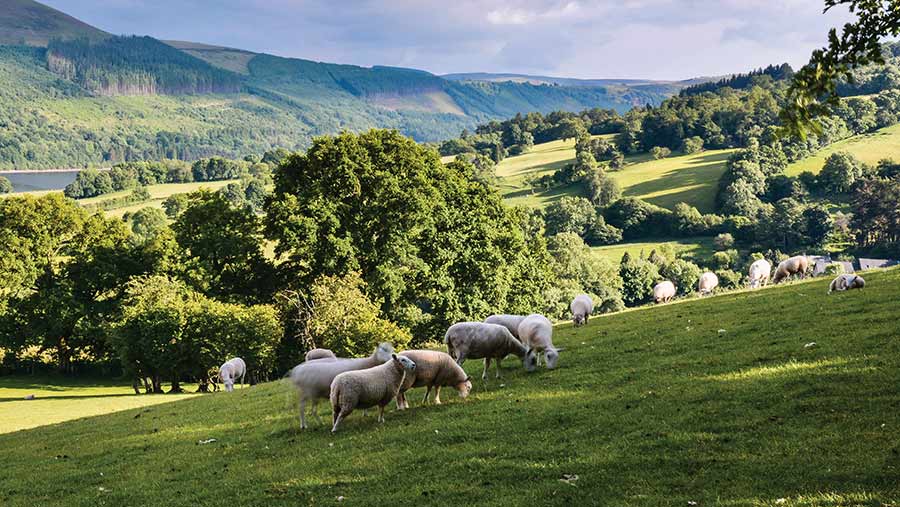Welsh post-Brexit scheme risks 11% drop in livestock numbers
 © Zen light/AdobeStock
© Zen light/AdobeStock The Welsh government has been accused of pursuing a “destocking agenda” after its own analysis showed the introduction of the new Sustainable Farming Scheme (SFS) risks a reduction of 122,000 livestock units – equivalent to 122,000 adult cattle or more than 800,000 sheep.
The research, carried out by Adas, SRUC and the University of Dublin and published alongside the latest SFS consultation, also found the introduction of the new scheme could lead to a cut of £199m in farm business income.
A third finding was that 5,522 jobs – 11% of the workforce – were at risk, in line with the drop in livestock numbers.
See also: Welsh government waters down 10% tree cover requirement
But the report authors suggested that longer agricultural hours and additional labour needed for woodland planting and management would offset some of these losses.
All three outcomes were said to be “worst-case” scenarios, as the modelling was based on an assumption of 100% take-up of the scheme and did not allow for possible adjustments to farming enterprises.
NFU Cymru president Aled Jones told Farmers Weekly the results of the analysis were “extremely stark”.
“We’ve got farmers who are still wearing the scars of inflation and input cost rises, businesses in nearly every sector that are already hamstrung by restrictive policy that is making day-to-day farming exponentially more difficult and expensive, all while delivering more than ever before – and now farmers are faced with proposals for which the latest projections predict a significant contraction in their industry,” he said.
“The consultation talks about keeping farmers farming the land and of ambition to make Welsh farmers the most sustainable in the world. This is incredibly far removed from the figures in the latest impact assessment. The two things are worlds apart.”
Income foregone
To come to its conclusions, the study considered four potential payment combinations (see below), all of which are based upon the “income foregone, costs incurred” model.
Payment rate combinations considered in study
- £91/ha for semi-natural habitats, £93/ha for woodland, and £28/ha for other (overall median rates from Phase 3)
- £222/ha for semi-natural habitats, £283/ha for woodland, and £42/ha for other (overall 75th percentiles from Phase 3)
- £91/ha for semi-natural habitats, £420/ha for woodland, and £28/ha for other (a mix, including current woodland payment rates)
- £91/ha for semi-natural habitats, £283/ha for woodland, and £42/ha for other (a mix)
The Welsh government has previously said future payment rates would “consider factors” beyond this approach and “recognise the social value provided by the outcomes delivered”.
“The problem with the income foregone model is it is quite plain the net margin is zero,” said Mr Jones.
“That’s why we are concerned. It is a consultation, it’s not final, and that’s why I will persevere, but I think people need to realise this is what we’re talking about.
“If you want to incentivise change – environmental protection, climate change mitigation, productivity – the only way to do it is if people join the scheme knowing there is an incentive and a margin for us to be part of it. That must be the ambition.”
Concern
Farmers’ Union of Wales president Ian Rickman was also concerned about the possibility of Welsh government maintaining an income foregone approach to payments.
“If we’re being asked to do more, payments need to be higher,” he said.
“The big concern is the Habitat Wales scheme. If the payment rate for that is indicative of payment rates going forward, that’s a big problem.
“Half the people who were in Glastir Advanced before haven’t signed up for the new Habitat Wales scheme.”
A Welsh government spokesperson said: “The economic assessment is an important piece of work which helped inform our consultation so those issues could be addressed.
“It is not an assessment of the current consultation. Full details of our proposals are in the consultation and we would urge people to take part and give us their views.”
Farmers urged to respond to SFS consultation
Farmers are being urged to respond to the fourth and final consultation on the Sustainable Farming Scheme (SFS), which was published alongside the analysis just before Christmas.
The document sets out proposals for rewarding farmers for “responding to the climate and nature emergencies”, as well as producing food in a sustainable way.
Aled Jones, NFU Cymru president, pleaded with all farmers to share their views.
“Every single person’s opinion is important,” he said.
“Please don’t sit at home and think others will respond. It is so important. I want every farmer to state an opinion. State an opinion on the overarching principles, but state an opinion on the impact on your business.
“Now is the time to pull out all the stops and have a huge volume of responses.”
The policy proposals have been published against a backdrop of significant uncertainty about future budgets, with the rural affairs budget having been cut by £37.5m in October.
Some Glastir participants entering the Habitat Wales scheme have already faced payment cuts of 50-70%.
The consultation closes on 7 March. See Gov.Wales to respond.
